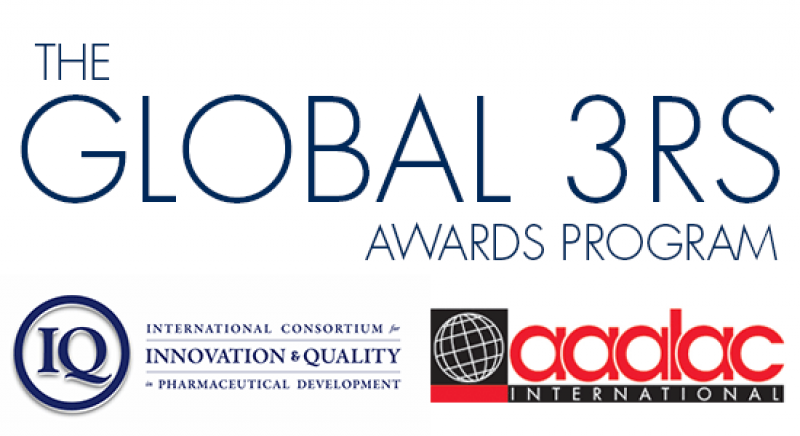2016 Global 3Rs Award Winners

November 21, 2016
The Global 3Rs Awards program, a collaboration between AAALAC International and the IQ Consortium, recognizes the following individuals for their significant innovative contributions toward the 3Rs of animal research to advance ethical science in academia or industry in any area of biology. The 2016 winners are:
EUROPE
Dr. Olivier Frey
Dr. Frey is Product Manager for Microphysiological Systems, InSphero AG, in Switzerland. He is receiving a Global 3R Award for the article, "3D Spherical Microtissues and Microfluidic Technology for Multi-Tissue Experiments and Analysis," Journal of Biotechnology, 2015. The paper is one of the outcomes of the European project "Body on a Chip," aimed at developing a next- generation multi-tissue assay platform based on 3-D spheroids from human cells in a microfluidic setup. The concept is highly versatile, robust and simple to use. It has set the basis for a follow up project with the goal to translate the system to a marketable product with the potential to generate more predictive data on the impact of compounds on the human body and ultimately reduce or even replace animal tests. This Global 3R Award prize will be used to develop a first prototype on a larger scale. The award will also be used to conduct the published cancer therapeutic prodrug cyclophosphamide experiment with human-derived liver spheroids and compare its predictive strength to the in vivo scenario, a first step towards completely replacing the use of animal cells.
NORTH AMERICA
Dr. Madhav Paranjpe
Dr. Paranjpe is Director of Pathology at BioReliance in Rockville, Maryland, USA. He is receiving a Global 3R Award for "Retrospective Evaluation of Doses in the 26-week Tg.rasH2 Mice Carcinogenicity Studies: Re-commendation to Eliminate High Doses at Maximum Tolerated Dose (MTD) in Future Studies," Toxicologic Pathology, 2015. Although significant advances have been made in carcinogenicity testing the general experimental design for these studies has remained virtually unchanged. Dr. Paranjpe thoroughly and systematically evaluated 29 carcinogenicity studies using Tg.rasH2 mice at the three federally mandated dose levels and recommended that the requirement for the high-dose group be reduced from the MTD, concluding that the low- and mid-dose groups detected carcinogenic effects in the test articles, whereas the high-dose (MTD) groups did not. The key recommendation to reduce the high-dose group and use only two test-article dose groups in each sex will result in a 25% reduction in the total number of mice evaluated per test article; provide similar test results without losing data; improve test predictability; improve ethical science; and improve the human relevance of these studies. The award will provide financial support to qualified graduate students.
PACIFIC RIM
Dr. Benjamin Quah
Dr. Quah is a Research Fellow at The John Curtin School of Medical Research, The Australian National University. He is receiving a Global 3R Award for "Use of an In Vivo FTA Assay to Assess the Magnitude, Functional Avidity and Epitope Variant Cross-Reactivity of T Cell Responses Following HIV-1 Recombinant Poxvirus Vaccination," PLoS ONE, 2014. Through superb experimental design and the application of advanced flow cytometry technology, a method for the pre-clinical multi-parameter screening of T and B lymphocytes post-vaccination (specifically, in the pre-clinical assessment of HIV vaccines using mouse models) was developed. These experiments address the clinical question of an HIV vaccine that mimics immune responses found in naturally HIV-resistant patients. A 140-fold reduction in the required number of mice was achieved. Notably, data generated from a total of 6,426 animals using a traditional 2-parameter assay can be now generated from only 45 animals. The award will support publishing the full pre-clinical reduction method in the 3Rs journal ALTEX, and reagents to support upcoming experiments on pre-clinical testing of cancer vaccines.
Global 3Rs Awards Disclaimer
The selection of the awardees represents the opinion of the reviewers. These reviewers regard these publications as innovations and promising advances worthy of recognition and reinforcement of exposure to the greater biomedical community. Award selection is not an endorsement or expectation that these specific 3Rs methods/procedures must be used by IQ Companies and/or AAALAC International accredited institutions. Ultimate adoption of a specific 3Rs strategy into a specific program is often complex and may include acceptance by regulatory bodies. Moreover, the committee recognizes that significant scientific corroboration and experience with the application of the new techniques may be required before a specific method or procedure warrants or achieves widespread adoption.
Visit http://www.aaalac.org/news/Global-3Rs-Award-Winners.cfm to see the original article.